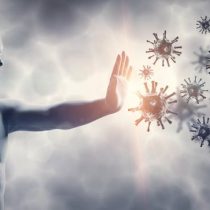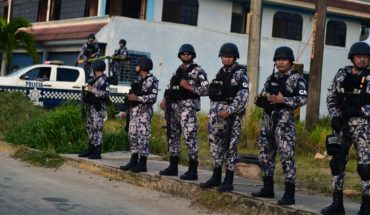
As the COVID-19 vaccination process progresses, the question becomes increasingly pressing: how long will our immunity last? Obviously, we do not yet have an evidence-based response, as not enough time has passed since the onset of the disease. But we already have some encouraging findings.
Immunological memory
When the immune system first comes into contact with an antigen, the components of the specific response take a few days to fully activate. In addition, this primary response does not reach all the power that the immune system could be capable of, and that is why we sometimes succumb to infections.
However, as a result of this encounter, memory cells are generated, which have a long life and which store information on how to destroy the antigen. If we find it again, the secondary response will be much faster, more powerful and effective thanks to the activation of those memory cells. That’s why we vaccinated, to generate memory cells that are able to control that pathogen if infection were to occur through a contagion.
Do coronaviruses generate memory?
We know that it does, because there are four coronaviruses that cause about 20% of common colds, as well as two other serious diseases: SARS (severe acute respiratory syndrome, which appeared in 2003) and MERS (Middle East severe acute respiratory syndrome, which appeared in 2012).
Memory against cold-causing coronaviruses isn’t very powerful, which is why we get sick so often, and there are other unrelated viruses that also produce it. And, as for SARS, we know that antibodies in people who passed the disease decreased rapidly and were barely detectable two years later, while antibody-producing memory cells (B lymphocytes) disappeared before the age of 6, so from then on there would be a lack of protection. However, recent studies have managed to find neutralizing antibodies 17 years after infection. Therefore, fears that immunity to SARS-CoV-2 was also ephemeral were justified.
Long-lived plasma cells
If we do an analysis, we probably still have antibodies to typical childhood diseases, such as measles or mumps, even though it has been many years since we had that disease and we have not had contact with the antigen again. How is this possible, considering that the activation of memory cells requires a new encounter with the pathogen? How can antibodies last so long?
Because, in addition to memory cells, we have another important ally to protect ourselves. When the B cell is activated after recognizing the antigen, it becomes a cell, called a plasma cell, which is the one that actually produces antibodies.
Most of these cells die when the infection ends, and are called short-lived plasma cells. But sometimes other very peculiar cells are generated that are in special niches in the bone marrow, and that are the so-called long-lived plasma cells. Sometimes, eternal life.
During all that time, they would be producing antibodies that would neutralize a new infection, as with rubella, infectious mononucleosis, mumps or measles. That is why we are not suffering from these diseases again.
Long-lived memory and plasma cells in Covid-19
Although we do not yet understand exactly how long immunity to SARS-CoV-2 will last, the outlook is now brighter than it was a few months ago, thanks to a host of findings.
First, it was found that anti-SARS-CoV-2 antibodies remained in the serum of patients who had suffered from the disease for at least 8 months, and that they were decreasing at a lower rate than initially feared.
Secondly, the antibody-producing memory cells remained very active and at very high levels throughout those 8 months, so it could be assumed that they would confer protection for a few years. Very recent studies have elevated this protection to at least 12 months with an apparent selection towards those cells more effective memory. More importantly, this protection increased markedly in individuals who had passed the disease and subsequently received a dose of vaccine. Yet another reason to get vaccinated.
Thirdly, in those subjects that, because they had a mild illness, these B cells were not found memory, they did have a very robust response by T cells memory, responsible for cellular immunity. I mean, it’s not all antibodies.
Fourthly, the response to vaccines induces a potent formation of plasma cells in the so-called germ centres, a fundamental requirement for these B cells to be produced by memory. So far, all good news.
But there’s more. The researchers were surprised that the decrease in the concentration of antibodies after suffering the disease had two phases: a first, in which they decayed rapidly, and another from which they remained stable. This pattern suggested that long-lived plasma cells might be responsible for maintaining these antibodies.
The hypothesis proved correct, since it was possible to isolate and purify these long-lived plasma cells, which had found their niche in the bone marrow, 11 months after suffering the disease. Great news. And it is because it tells us that, in addition to having a vigorous long-term response of T and B cells, we are also going to have plasma cells that will be producing antibodies to the virus for probably many years.
Clouds on the horizon: the new variants
Does this mean that we will never have to be vaccinated again? Probably not, although only the passage of time will tell. It is quite possible that reminder doses may need to be administered to strengthen immunity at some point, if it is observed that it declines. And of course, all this immunity is generated against the original virus, which is the content of the vaccines that we are administering.
We cannot exclude the emergence of new variants, different enough from the original, that they manage to escape our memory cells, which only remember what they have already seen. And, in this case, targeted vaccines against these new variants will have to be administered.
That is why, despite the current climate of greater optimism on the part of the scientific community, we cannot lower our guard. We are going to live with the virus for many years, so we will have to keep a close eye on it. History cannot repeat itself.
Ignacio J. Molina Pineda de las Infantas, Professor of Immunology, Biomedical Research Center, University of Granada
This article was originally published in The Conversation. Read the original.





